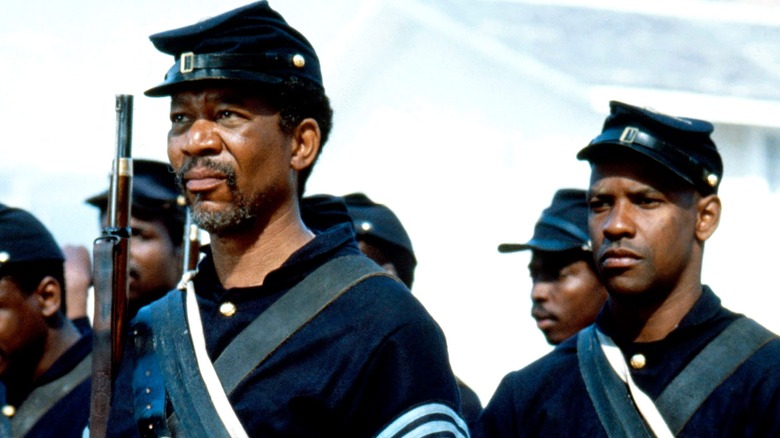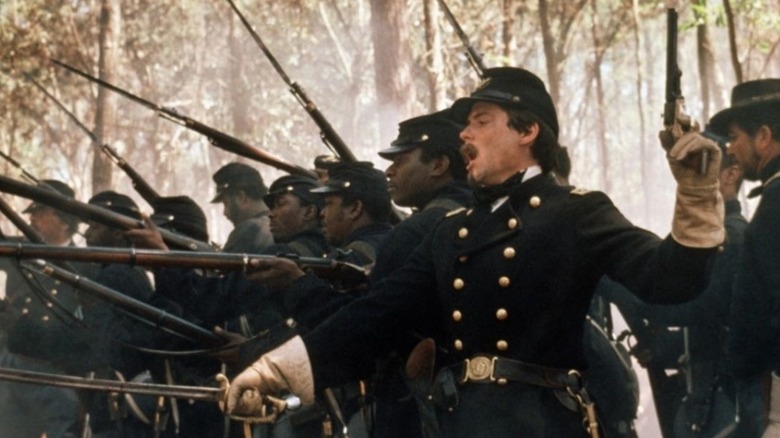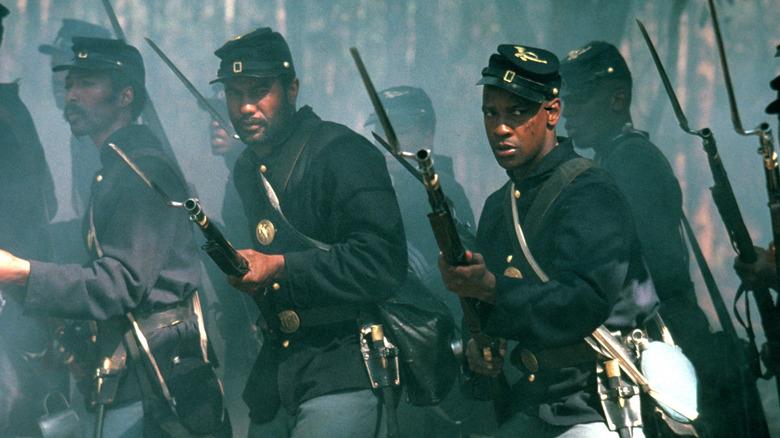Getting The Money To Make Glory Was A Struggle At Every Step
The U.S. Civil War drama "Glory" was Denzel Washington's breakout movie role. The film earned him his first Oscar and set the stage for him to follow up with classics such as "Malcom X," "Philadelphia," and "Training Day." Directed by Edward Zwick and released in 1989, "Glory" chronicles the rise of the 54th Massachusetts Infantry Regiment, one of the first African American armed forces, as they fight to prove themselves as worthy soldiers for the Union Army.
Initially, Hollywood executives wanted no parts of the film. For four years, funding was so dry that the star-studded cast — which included Morgan Freeman, Matthew Broderick, and Cary Elwes — all took pay cuts to be involved with the project, per a 1989 New York Times article. The film's producer, the late Freddie Fields, explained what had deterred Hollywood from backing the film. Simply put:
”[Hollywood executives'] computer printouts said ["Glory"] was about all of the things that don't fit the conventional formulas for box-office success."
Soldiers vs. sequels
Freddie Fields' three-decade-old quote echoes all the way to present day. Studio executives prioritize projects that have the potential to award them with big returns on investments. Unfortunately for "Glory," the movie industry was face-deep in the blockbuster boom in the '80s. Sci-fi and horror movies, as well as installments from the "Star Wars," "James Bond," and "Indiana Jones" franchises were proven commodities as studios saturated the market with sequels to past successes. The horror franchise "Friday the 13th," for example, spawned seven sequels in just that one decade (though they should've stopped at two).
Paramount Pictures released "Indiana Jones and the Last Crusade" the same year as "Glory," and it grossed $474 million worldwide; the first and second installments grossed $390 million and $333 million, respectively. Meanwhile, no precedent existed to show that a historical war movie centering largely unknown African American soldiers would pack theatres. Looking at it through that lens, it's plain to see why Hollywood shunned a project like "Glory."
But does it always have to be about the moolah?
"Glory" earned $27 million in theaters against a $18 million budget – not exactly "Indiana Jones" numbers. But a film doesn't always have to justify its existence at the box office; the impact "Glory" continues to have will outlast any dollar it ever earned at the box office. The film has become an educational resource for teachers in the classroom. It is, in essence, infotainment, filling in gaps left in the U.S. history textbooks.
I studied U.S History all through grade-school and not once did I read about the 54th Massachusetts Infantry Regiment in my textbooks. I didn't come across "Glory" until my freshman year of college while taking an intro to film class. I was both enthralled by Denzel Washington's performance and enlightened by the little-known regiment.
The film is not without flaws. For one, the main protagonist in a movie intended to celebrate an African American regiment happens to be its white colonel (Matthew Broderick). That definitely would get called out on Twitter if the movie was released today. Even so, "Glory" has maintained historical significance more than 30 years after its release and should be preserved in the National Film Registry. The film serves as proof that some projects deserve to be funded despite not having blockbuster potential.


